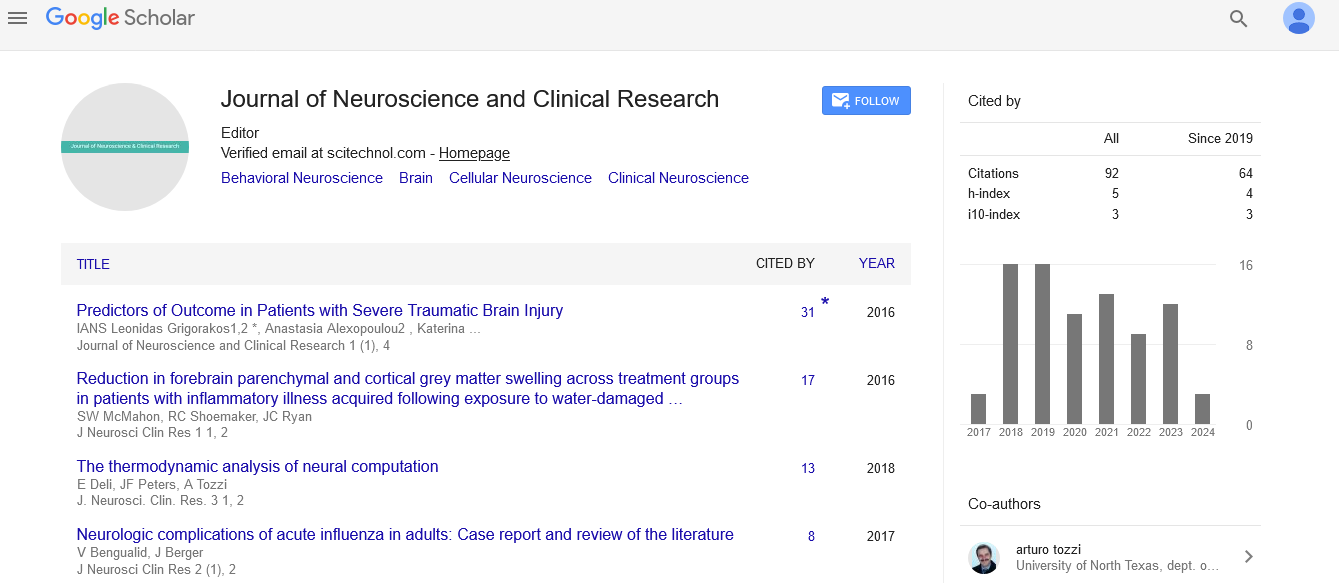Editorial, J Neurosci Clin Res Vol: 6 Issue: 4
Stroke: Mechanisms in Search of Treatments
Klaus Rüdiger Helmut von Wild*
Department of Neurosurgery, Westphalian Wilhelm’s-University, Munster, Germany.
*Corresponding Author: Klaus Rüdiger Helmut von Wild
Department of
Neurosurgery, Westphalian Wilhelm’s University, Germany
E-Mail: klauswild@gmail.com
Received date: July 7, 2021; Accepted date: July 21, 2021; Published date: July 28, 2021.
Citation: Wild KRHV (2021) Stroke: Mechanisms in Search of Treatments. J Neurosci Clin Res.Vol.6 No.4
Abstract
A stroke occurs when the blood supply to part of your brain isinterrupted or reduced, preventing brain tissue from getting oxygen and nutrients. Brain cells begin to die in minutes. A stroke is a medical emergency, and prompt treatment is crucial. Early action can reduce brain damage and other complications. The good news is that many fewer Americans die of stroke now than in the past. Effective treatments can also help prevent disability from stroke.
Keywords: Stroke, oxygen and nutrients, Headache, Trouble walking, disability
Introduction
A stroke occurs when the blood supply to part of your brain isinterrupted or reduced, preventing brain tissue from getting oxygen and nutrients. Brain cells begin to die in minutes. A stroke is a medical emergency, and prompt treatment is crucial. Early action can reduce brain damage and other complications. The good news is that many fewer Americans die of stroke now than in the past. Effective treatments can also help prevent disability from stroke.
Signs and symptoms of stroke include
Trouble speaking and understanding what others are saying. You may experience confusion, slur your words or have difficulty understanding speech. Paralysis or numbness of the face, arm or leg: You may develop sudden numbness, weakness or paralysis in your face, arm or leg. This often affects just one side of your body. Try to raise both your arms over your head at the same time. If one arm begins to fall, you may be having a stroke. Also, one side of your mouth may droop when you try to smile. Problems seeing in one or both eyes: You may suddenly have blurred or blackened vision in one or both eyes, or you may see double.
Headache: A sudden, severe headache, which may be accompanied by vomiting, dizziness or altered consciousness, may indicate that you're having a stroke.
Trouble walking: You may stumble or lose your balance. You may also have sudden dizziness or a loss of coordination.
The brain is an extremely complex organ that controls various body functions. If a stroke occurs and blood flow can't reach the region that controls a particular body function, that part of the body won't work as it should. If the stroke occurs toward the back of the brain, for instance, it's likely that some disability involving vision will result. The effects of a stroke depend primarily on the location of the obstruction and the extent of brain tissue affected. The effects of a stroke depend on several factors, including the location of the obstruction and how much brain tissue is affected. However, because one side of the brain controls the opposite side of the body, a stroke affecting one side will result in neurological complications on the side of the body it affects. Few neurological conditions are as complex and devastating as stroke, the second leading cause of death worldwide. Also called a brain attack, victims may suddenly experience paralysis, impaired speech or loss of vision due to interruption of blood flow (ischemia) caused by thrombosis or embolism. A stroke happens when blood flow to any part of the brain stops. If blood flow is cut off for longer than a few seconds, the brain cannot get nutrients and oxygen. Brain cells can die, causing death or serious lasting damage. The longer the time that the brain is cut off from oxygen, the more severe the damage.
The effects of stroke vary from person to person based on the type, severity, location, and number of strokes. The brain is very complex. Each area of the brain is responsible for a specific function or ability. When an area of the brain is damaged from a stroke, the loss of normal function of part of the body may occur. This may result in a disability.
 Spanish
Spanish  Chinese
Chinese  Russian
Russian  German
German  French
French  Japanese
Japanese  Portuguese
Portuguese  Hindi
Hindi 